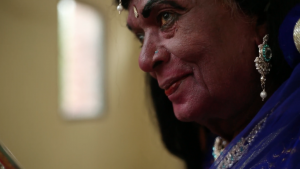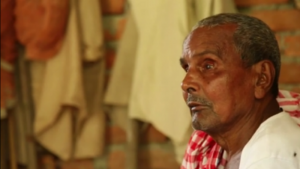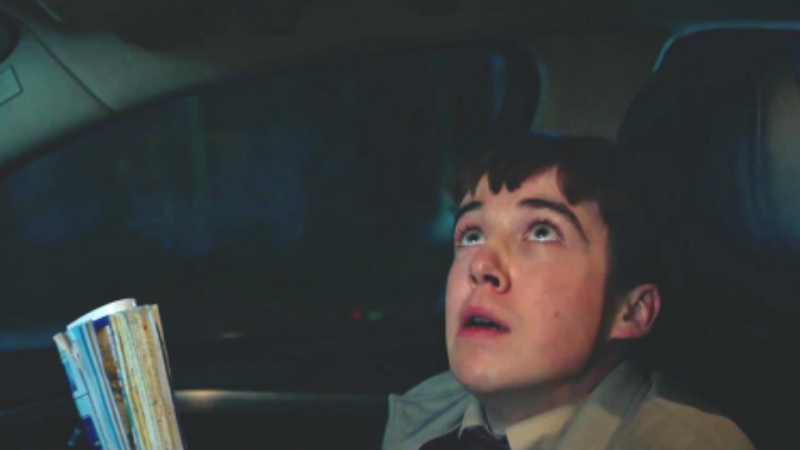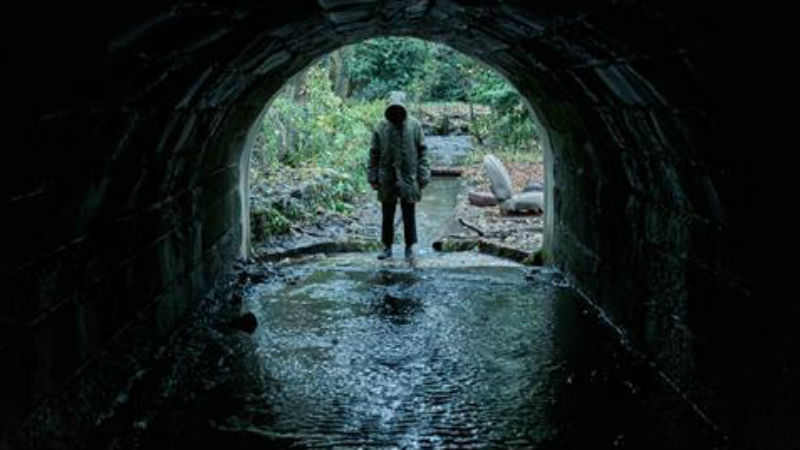Night time. An open air, square theatre stage under a canopy. Backstage, a male performer dons bras and stuffs them with padding to create the impression of boobs. Out front, a member of the company in traditional Indian male clothing, a gold suit with a purple scarf, tells the expectant audience to be patient and explains that the upcoming performance will be in Bhojpuri (the language spoken by the Bhojpuri people who live in the Bihar region of North West India and Southern Nepal). Assorted musicians sit behind him at the back of the stage, among them tabla and sarang players, who will accompany the performance.
He starts walking up and down the stage, gesturing expressively with his arms and hands, singing an expository song about Bhikhari whose low birth belied his significant cultural contribution to Indian theatre. As the play proper gets underway, a man and a woman (played by a man) argue about her going to work in Calcutta. Also on the stage is a stock Joker character, in a black costume with white collars and ruffs, whose role appears to lie somewhere between the the idea of a Greek chorus commenting on events and a character who makes provocative suggestions to the other characters in the play. The performance is intriguing and possessed of a certain charm, even if the proceedings are a little impenetrable to Western viewers unfamiliar with the local culture or this specific art form.

Welcome to the Naach, a form of Indian folk theatre developed by social activist and playwright Bhikhari Thakur (1887-1971), the ‘Shakespeare of Bhojpuri’, whose presence inevitably hangs over this documentary which sports both his name and that of his art form in its title. Curiously, there’s no direct attempt to show pictures of him or tell the story of his life in any sort of direct fashion. Instead, the film makers show excerpts of live Naach performances, often with little explanation as to what’s going on within them, and intersperse interview material featuring four ageing Naach performers, each one interviewed separately.
Lakhichand Manjhi, 67, explains how Bhikhari’s troupe assimilated a rival troupe run by Gaurishankar. We see him wandering around the National Academy of Music, Dance and Drama, applying makeup, donning costumes. Ram Chander Chhote, 70, talks about Bhikhari’s low birth – a big deal in India under the caste system -– and how he would doggedly affect the outward signs of his social status by sitting on a plain mat rather than a chair when addressing people of high birth as a way of reinforcing his own cultural identity.

Bhikhari’s play Beti Bechwa is discussed, dealing as it does with the once common practice of men selling their daughters into marriage at local markets. “There’d be rows of girls. People would inspect them like one inspects cattle,” says Shival Baari, 75. These days, this apparently no longer happens. The practice started being prohibited after people first saw the play performed.
Naach Bhikhari Naach plays in the UK on Sunday, May 19th at Hundred Years Gallery, Hoxton, London. Click here for more info. Watch the film trailer below:










